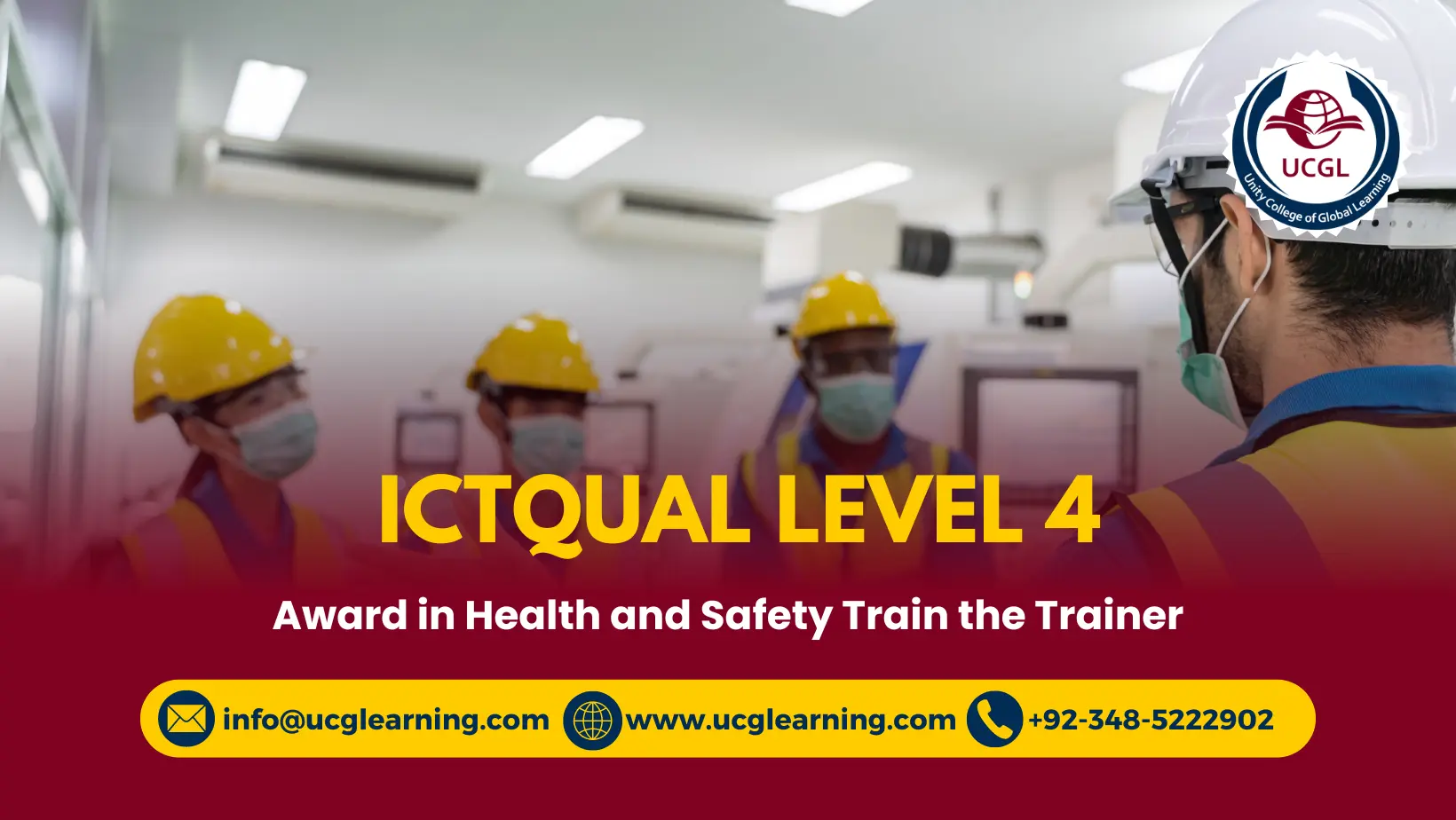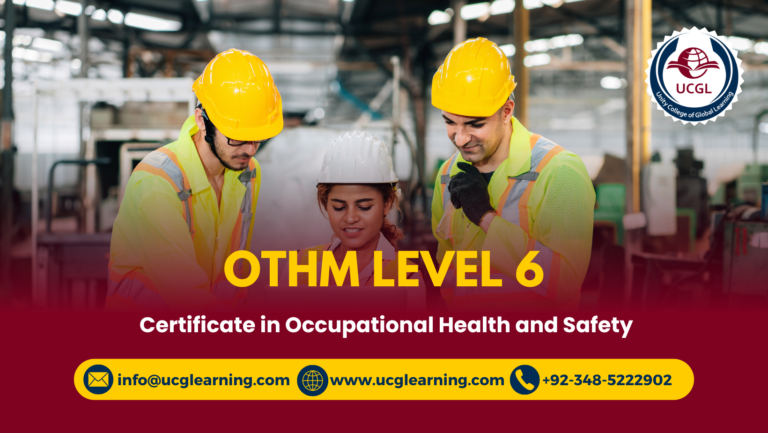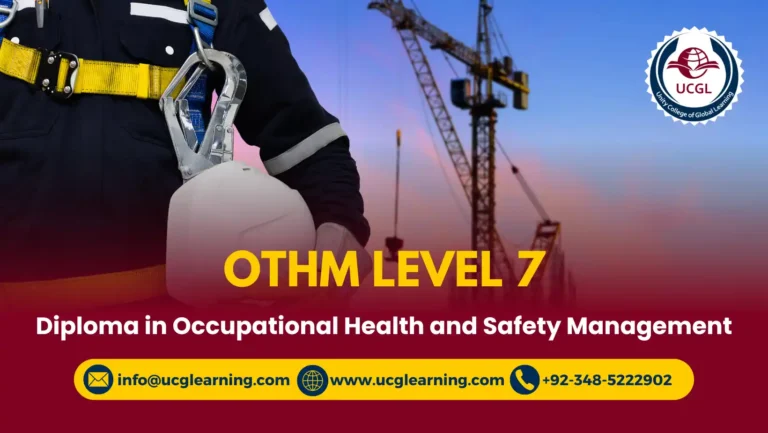ICTQual Level 4 Award in Health and Safety Train the Trainer
In today’s dynamic work environment, ensuring health and safety compliance is paramount for organizations across industries. The ICTQual Level 4 Award in Health and Safety Train the Trainer offers a comprehensive and structured approach to equipping individuals with the skills and knowledge needed to become proficient health and safety trainers.
Course Introduction
ICTQual Level 4 Award in Health and Safety Train the Trainer is a valuable investment for individuals seeking to make a positive impact in the field of health and safety training. By completing this course, participants not only enhance their own professional development but also play a crucial role in safeguarding the well-being of individuals and organizations alike.
Course Benefits:
- Expertise Development: Participants gain in-depth knowledge of health and safety regulations, practices, and training methodologies, enhancing their expertise in the field.
- Trainer Proficiency: The course hones participants’ training skills, enabling them to deliver engaging, effective, and compliant health and safety training sessions.
- Organizational Compliance: Organizations benefit from having trained professionals who can deliver high-quality health and safety training, ensuring compliance with regulations and promoting a safe working environment.
Course Study Units:
- Introduction to Health and Safety Training
- Health and Safety Legislation and Regulations
- Risk Assessment and Hazard Identification
- Emergency Preparedness and Response
- Accident Prevention and Investigation
- Training Needs Analysis and Program Development
- Training Delivery and Facilitation Techniques
- Assessing Learning and Providing Feedback
- Continuous Professional Development and Improvement
Learning Outcomes:
Introduction to Health and Safety Training:
- Understand the importance of health and safety training in the workplace.
- Recognize the role of health and safety trainers in promoting a culture of safety.
- Identify key concepts and principles of health and safety training.
- Appreciate the benefits of effective health and safety training for individuals and organizations.
Health and Safety Legislation and Regulations:
- Familiarize with relevant health and safety legislation and regulations applicable to the workplace.
- Understand the legal obligations of employers, employees, and other stakeholders in ensuring workplace safety.
- Identify regulatory requirements related to specific hazards and industries.
- Learn how to interpret and apply health and safety laws and regulations in practical scenarios.
Risk Assessment and Hazard Identification:
- Develop skills in identifying hazards and assessing risks in the workplace.
- Understand the risk assessment process, including hazard identification, risk analysis, and risk control measures.
- Learn techniques for prioritizing risks and implementing appropriate control measures.
- Gain proficiency in conducting risk assessments across different work environments and activities.
Emergency Preparedness and Response:
- Understand the importance of emergency preparedness in mitigating workplace hazards.
- Learn how to develop and implement emergency response plans and procedures.
- Familiarize with emergency communication protocols and evacuation procedures.
- Develop skills in responding to emergencies effectively and minimizing risks to personnel and property.
Accident Prevention and Investigation:
- Understand the root causes of workplace accidents and incidents.
- Learn techniques for preventing accidents through hazard identification, risk reduction, and safety management.
- Develop skills in conducting accident investigations, including gathering evidence, analyzing root causes, and implementing corrective actions.
- Identify strategies for promoting a proactive safety culture and preventing future incidents.
Training Needs Analysis and Program Development:
- Gain proficiency in conducting training needs assessments to identify learning gaps and training priorities.
- Learn how to develop comprehensive training programs that address organizational objectives and regulatory requirements.
- Understand the importance of aligning training programs with organizational goals and learner needs.
- Develop skills in designing training materials, resources, and activities to support effective learning outcomes.
Training Delivery and Facilitation Techniques:
- Master a range of training delivery techniques, including lectures, workshops, demonstrations, simulations, and role-plays.
- Develop effective presentation and facilitation skills to engage learners and create a positive learning environment.
- Learn how to adapt training delivery techniques to accommodate diverse learning styles and preferences.
- Gain confidence in delivering dynamic and interactive training sessions that enhance learner comprehension and retention.
Assessing Learning and Providing Feedback:
- Understand the importance of assessing learning outcomes to measure training effectiveness.
- Learn how to develop assessment tools and methods, including quizzes, tests, observations, and simulations.
- Develop skills in providing constructive feedback to learners to enhance their performance and encourage continuous improvement.
- Gain proficiency in evaluating training effectiveness and identifying areas for improvement in training delivery and content.
Continuous Professional Development and Improvement:
- Recognize the value of lifelong learning and continuous professional development in the field of health and safety training.
- Identify opportunities for expanding knowledge, skills, and expertise through ongoing education, training, and professional networking.
- Develop a personalized professional development plan to enhance effectiveness as a health and safety trainer.
- Commit to staying informed about industry trends, best practices, and innovations to maintain relevance and competency in the field.
By mastering the learning outcomes of each study unit, participants can develop a comprehensive understanding of health and safety training principles and practices, and become proficient trainers capable of promoting a culture of safety and compliance in the workplace.
Who is This Course For?
- Health and Safety Professionals: Individuals working in health and safety roles who want to enhance their training skills and contribute to organizational safety.
- Training Managers: Professionals responsible for designing, delivering, or managing health and safety training programs within organizations.
- Human Resources (HR) Professionals: HR managers and specialists involved in training and development who want to specialize in health and safety training.
- Aspiring Trainers: Individuals aspiring to become health and safety trainers and seeking a recognized certification to validate their skills and expertise.
Future Progression for This Course:
Upon completion of the ICTQual Level 4 Award in Health and Safety Train the Trainer, participants may pursue further qualifications or career advancement opportunities, such as:
- Higher-level qualifications in health and safety training or related fields.
- Specialization in specific areas of health and safety, such as occupational health and safety management or industrial hygiene.
- Opportunities to become certified trainers for accredited health and safety courses, expanding their professional reach and impact.
ICTQual Level 4 Award in Health and Safety Train the Trainer is a valuable credential for individuals passionate about promoting health and safety in the workplace. By completing this course, participants not only enhance their own skills and expertise but also contribute to creating safer and healthier work environments for employees and organizations alike.







